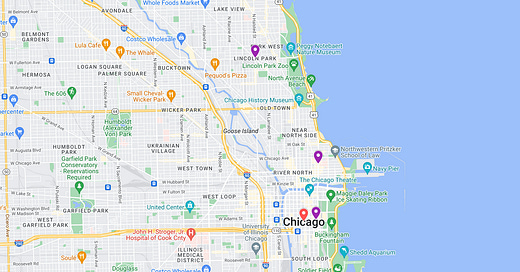Was Dietrich Bonhoeffer’s right about collective stupidity?
New Chicago Mayor Brandon Johnson is proving to be just what the city doesn't need—but did want.
In late February, I visited Chicago with my daughter for college tours. I’d been to Chicago a number of times but never had I been all around, from Lincoln Park to The Loop to the Magnificent Mile. The weather was unseasonably warm, thankfully, and the city itself was beautiful, making me regret not spending more time their over the years.
In between college visits, we enjoyed sightseeing and engaging in the three B’s—books, brew (coffee), burgers, and, in this case pizza from a Chicago institution, Lou Malnati’s Pizzeria. (Deep dish isn’t for me, but the pizza was quite good.) But aside from the great weather and the amazing food, something else was ever-present: political signs.
Politics were hard to ignore
As we walked about the city, it was obvious that political campaign season was in full swing, as Paul Vallas and Brandon Johnson, the challengers for outgoing Mayor Lori Lightfoot’s seat, signs were everywhere, making it impossible to forget that they were engaged in a runoff. Vallas, a White moderate, was making a strong case as the person to get the city’s crime under control. Though the murder rate is down from previous years, according to news reports, the city remains among the top in the category nationwide.
His opponent, Johnson, a progressive activist and teacher’s union favorite who once supported defunding the police, was making the case that Vallas was the wrong man for the job, which required a long view in controlling crime, to the former’s thinking. That long view amounts to providing jobs for idle youths instead of beefing up patrols in high crime areas and around the business community, which has been hit hard of late with shoplifting and looting.
Given the mess that Lightfoot was leaving for the next mayor, I was convinced that the city would do the right thing and choice Vallas, who seemed like a man for the time, a sensible choice. I was dead wrong. Johnson won handily. I was floored. Why? “How could the people of Chicago be so stupid?” I asked myself. I immediately thought of Dietrich Bonhoeffer.
Johnson won. Chicago lost.
In 1943, Bonhoeffer, a Lutheran pastor and member of the German resistance, was arrested and thrown in prison, where he used his time to question why the German people—despite their culture, education, and accomplishments—fell ill with what he termed collective stupidity, which he saw not as stupidity in the strictest sense but as a loss of critical reasoning.
“Stupidity is a more dangerous enemy of the good than wickedness. Evil can be protested against, exposed, and, if necessary, it can be prevented by force. Evil always harbors the germ of self-destruction by inducing at least some uneasiness in people. We are defenseless against stupidity. Nothing can be done to oppose it, neither with protests nor with violence. Reasons cannot prevail. Facts that contradict one’s prejudice simply don’t need to be believed, and when they are inescapable, they can simply be brushed aside as meaningless, isolated cases.
“To understand how to deal with stupidity, we must try to understand its nature. This much is certain: it is not essentially an intellectual, but a human defect. There are people who are intellectually agile who are stupid, while intellectually inept people may be anything but stupid. We discover this to our surprise in certain situations.
“A closer look reveals that the strong exertion of external power, be it political or religious, strikes a large part of the people with stupidity. Under this influence, human abilities suddenly wither or fail, robbing people of their inner independence, which they—more or less unconsciously—renounce to adapt their behavior to the prevailing situation.
Before anyone gets the wrong idea, I’m not calling the people who voted for Johnson stupid. (I am, however, saying he was the worst candidate of the two.) Several friends and family members call Chicago home; I would never impugn them for living in the city, which I realize has many fine communities.
Instead of looking to Bonhoeffer for answers, my gaze was, in error, affixed on Survivorship Bias, the tendency to attribute a positive correlation—Johnson winning—to my reasoning that their had to be something amiss about the people who voted for him. Turns out, Johnson’s election was more about the people who weren’t there than it was about the people who are still there, as The Wall Street Journal highlighted in their article You Can’t Throw the Bums Out if You’ve Voted With Your Feet.
“Brandon Johnson’s victory in last week’s Chicago mayoral race is a reminder that no matter how bad things get, they can always get worse. Chicago is functionally bankrupt. Its high crime and taxes are driving away businesses like Citadel, Boeing and Tyson Foods. Despite some of the highest property taxes in the country, its pension funds are in a death spiral. Scads of people are moving out. A net 175,000 people left Cook County between 2020 and 2022.”
And what was Johnson’s margin of victory? Roughly 20,000 votes.
The WSJ article continued: “Therein lies an enormous problem for Chicago and other big cities: Left-wing policies are driving away the types of voters and businesses needed for a course correction.
“Between 2020 and 2022, about 71,000 people on net left San Francisco—nearly 10% of its population. During the same period some 503,000 moved out of New York City—about four times the population of Topeka, Kan. High levels of out-migration amount to a political as well as economic brain drain. Cities are losing the voters who keep their leaders from going off the rails.
“America’s big cities are increasingly steered by the interests of government unions and those who depend on the government dole. Unlike businesses, cities can’t liquidate. Politicians can always raise more money from taxpayers to pay off their public-union friends and buy votes from the government-dependent class, which nowadays includes outfits that contract with cities to provide social services.”
The big city problem: crime
A recent newsletter from The Atlantic, titled Big Cities Are Ungovernable, provided some context, making it clear that the problem is not unique to Chicago. Big cities nationwide are struggling.
“[M]ore than anything else, crime is weighing mayors down. Crime is not, despite what some politicians might want you to believe, a uniquely urban problem. When violent crime surged around the nation starting in summer 2020, it surged in rural areas, too. But cities get more media attention, and the sheer numbers are staggering: The yearly total of murders in Chicago dropped by more than 100 in 2022—to a horrifying 695. New Orleans has one of the highest murder rates in the nation.
“Like presidents who are punished or rewarded for the performance of an economy over which they have little control, mayors don’t have that many levers to control public safety, yet voters will punish whoever is in charge as they search for improvement. The rise in violence was a nationwide trend, underscoring the minimal effect of municipal policies on keeping residents safe. COVID, which seems connected to some of the crime increase, was nationwide too.
“A mayor can try to hire more police officers or reform the department, but that’s slow. She can seek new leaders, but Chicago, for example, has churned through police superintendents recently to little effect. (The current one yesterday announced plans to resign, facing the alternative of being sacked by whichever candidate wins the April runoff.)
“Pushing too hard risks alienating police, who can either come down with “blue flu,” potentially sending crime higher, or line up behind a challenger; the Chicago police union endorsed Paul Vallas, the top vote-getter on Tuesday. Most cities have little control over gun regulations. A mayor can try to address root causes through economic development, but that, too, is slow and subject to larger trends.”
Hopeful but not optimistic
I’d like to say that I have a modicum of confidence that Johnson will prove to be a better leader than Lightfoot, who has been notoriously terrible as Mayor. But, the only thing I feel assured in saying is that Chicagoans will get more of the same because that’s what they voted for. That much, I feel very confident about.





